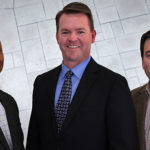WASHINGTON (ABP) — Baptists, they say, multiply by dividing. And the various Baptist churches and denominational groups represented in the incoming 111th Congress are emblematic of America’s broad array of Baptists — and of religious life in general.
While precise figures and specific answers on some lawmakers’ church membership are hard to come by, there are 66 self-identified Baptists in the new Congress, according to a study by the Pew Forum on Religion and Public Life.
Baptists make up a slightly smaller percentage of the new Congress (12.4 percent) than they do of the United States’ adult population at large (17.2 percent), according to the Pew study. It was based on biographical data that Congress members’ offices provided to Congressional Quarterly. The nation-at-large statistics come from the results of a massive survey that Pew released last year.
Broadly diverse
An analysis of the new Baptist Congress members by Baptist blogger Aaron Weaver reveals that congressional Baptists are a broadly diverse lot in terms of denomination, race and political party.
For instance, congressional Baptists belong to churches affiliated with the Southern Baptist Convention, the three major African-American Baptist denominational groups, the American Baptist Churches USA, and the Baptist General Conference.
There are also several members of Congress whose churches’ primary affiliation is with para-denominational groups that resulted from the division between moderates, progressives and fundamentalists in the Southern Baptist Convention during the 1980s — the Cooperative Baptist Fellowship and the Alliance of Baptists.
At least one member of Congress — North Carolina Rep. David Price (D) — belongs to a church affiliated with the gay-friendly Association of Welcoming and Affirming Baptists.
In the House, self-identified Baptists are evenly divided between Democrats and Republicans, with each party claiming 29 Baptist representatives. African-American Baptists make up 33 percent of House members.
Sign up for our weekly edition and get all our headlines in your inbox on Thursdays
Several of the most prominent members of Congress on both sides of the aisle identify as Baptists. Sen. Robert Byrd (D-W.Va.), the Senate’s president pro tempore and the lone white Baptist Democrat in that chamber, is a member of Crab Orchard Missionary Baptist Church (ABCUSA) in Crab Orchard, W.Va.
McCain & family
Arizona Sen. John McCain, the failed GOP nominee for president in 2008, identifies North Phoenix Baptist Church as his home congregation. Although McCain — who was baptized into the Episcopal Church as an infant and has not undergone believer’s baptism as an adult — is not technically a member of North Phoenix Baptist, his wife and their children are.
North Phoenix Baptist has the distinction of being the church home to two members of Congress — McCain and Arizona Rep. Trent Franks (R).
Senate Minority Leader Mitch McConnell (R-Ky.) still lists his denominational affiliation as Baptist, although he reportedly now attends Southeast Christian Church in Louisville. He was a longtime member of Crescent Hill Baptist Church in Louisville, but church officials said Jan. 5 he is no longer on their membership roll.
House Majority Leader Steny Hoyer (D-Md.), is a member of Broadview Baptist Church in Temple Hills, Md.
Baptists are the second-largest religious group in Congress after Catholics, who make up 30 percent of lawmakers. The next four largest groups — Methodists, Jews, Presbyterians and Episcopalians — are represented in Congress in greater percentages than they are in the population at large.
The “religious group” most underrepresented relative to its share of the overall population is the religiously unaffiliated. Only five members of the 111th Congress failed to list any religious affiliation, according to Congressional Quarterly. But the Pew survey found that the religiously unaffiliated make up just over 16 percent of the U.S. adult population.
The 111th Congress is also home to Lutherans, Eastern Orthodox Christians, Pentecostals, Mormons, Seventh-Day Adventists, Muslims, Buddhists, Unitarians, Christian Scientists and a Quaker.
Read more
Most evangelicals, Baptists tolerant, even universalist, survey suggests (7/25/2008)
Broad U.S. religious marketplace spurs conversion, study suggests (2/26/2008)














We seek to connect God’s story and God’s people around the world. To learn more about God’s story, click here.
Send comments and feedback to Eric Black, our editor. For comments to be published, please specify “letter to the editor.” Maximum length for publication is 300 words.